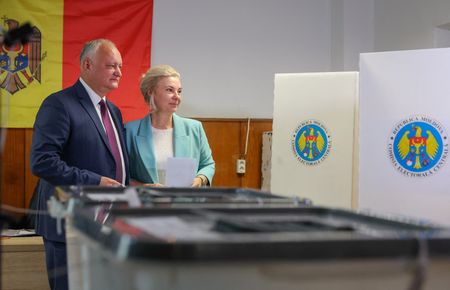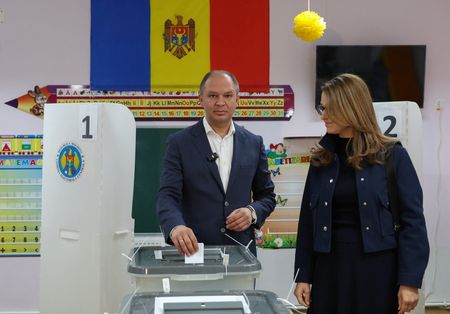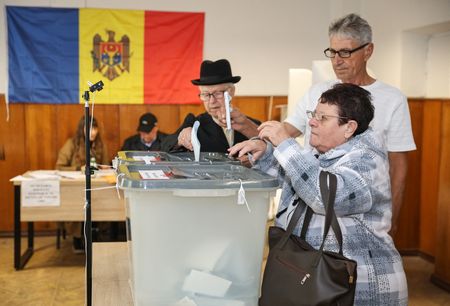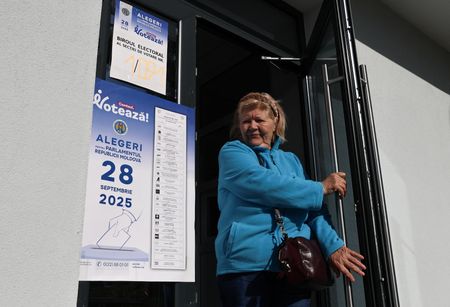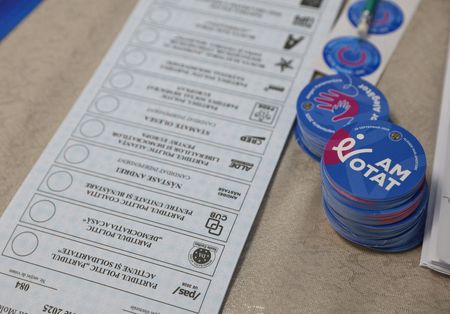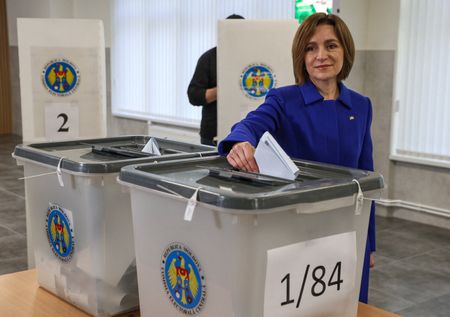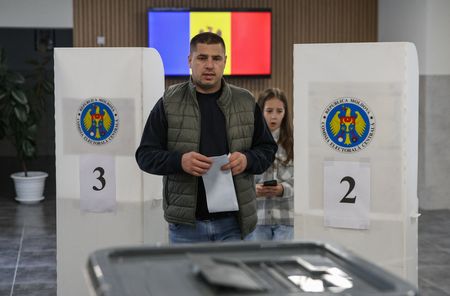By Dan Peleschuk
CHISINAU (Reuters) -Moldovans were voting in a parliamentary election on Sunday that could have a major impact on the government's quest to join the European Union, as a pro-Russian opposition group seeks to steer the nation away from closer ties with the bloc.
If neither side wins a majority in the 101-seat chamber, political horse trading is likely to follow, further unsettling one of Europe's poorest countries, buffeted by war in neighbouring Ukraine and suspected Russian meddling in politics and religion.
As the poll was underway, a pro-Russian leader called for potential post-vote protests and cyber authorities reported that election infrastructure had been attacked over the past two days.
MOLDOVA'S GOVERNMENT WARNS OF RUSSIAN INTERFERENCE
President Maia Sandu casts the election as an existential test for the country of 2.4 million, which also has close cultural and linguistic ties with its western neighbour Romania.
The government has complained of an extensive Russian campaign to sway the vote. Sandu, who wants Chisinau to join the EU by 2030, has warned of "immediate and dangerous" consequences if Russian influence prevails.
Opposition groups like the pro-Russian Patriotic Bloc have tapped into voter unease over economic turmoil and the slow pace of reforms, grievances worsened by what officials say has been widespread disinformation.
Days before the vote, election officials struck two parties in the Patriot Bloc from the ballot amid allegations of illegal financing.
Authorities have launched hundreds of raids in recent weeks targeting illicit party funding and alleged Russian-backed networks aimed at stirring unrest over the vote.
Moscow has denied meddling and says the government is spreading anti-Russian hysteria to win votes.
Igor Dodon, a former president and leader in the Patriotic Bloc, accused Sandu's government on Sunday of preparing to annul the vote and called supporters to rally in front of parliament on Monday. He did not provide any evidence.
RULING PARTY HOPES TO KEEP MAJORITY
Turnout was around 30% by midday.
Voter participation at polling stations in central Chisinau, where both Romanian and Russian are widely spoken, appeared to be slow in the morning but was picking up, authorities said.
Polls indicate Sandu's Party of Action and Solidarity (PAS) could struggle to keep its majority. It is relying heavily on motivated voters, including among Moldovans who live abroad.
"(Sandu) is doing what she can with what she has," said Mariana Rousset, 45, who travelled to Chisinau from France to vote.
If it loses its majority, PAS will be forced to seek coalition partners among opponents like the centre-left Alternative bloc or the populist Our Party - if they pass the threshold to enter parliament.
MOLDOVANS DIVIDED OVER FUTURE PATH
Power in the former Soviet republic has swung for decades between pro-European and pro-Russian groups.
While Sandu and PAS see European integration as a central focus, many voters appear more occupied with domestic issues, wary of what closer ties with the EU might mean for Moldova's heavily agricultural economy.
Viorica Burlacu, a fruit seller in the capital Chisinau, said that the war in Ukraine showed that Moldova needed Europe's protection.
"We're afraid of war; no one wants that," said the 46-year-old. "So we're reaching out to Europe for at least some protection."
In Balti, a northern Moldovan city, 82-year-old Maria Scotari offered a different perspective. She recalled being happy as a young student living in the Soviet Union.
"What was so bad about it? That's how life was. I was a student, everything was fine, everything was great."
(Reporting by Dan Peleschuk in Chisnau; Additional reporting by Alexander Tanas in Chisnau and Alexandru Fedas in Balti; Editing by Mike Collett-White, Kevin Liffey and Bernadette Baum)


